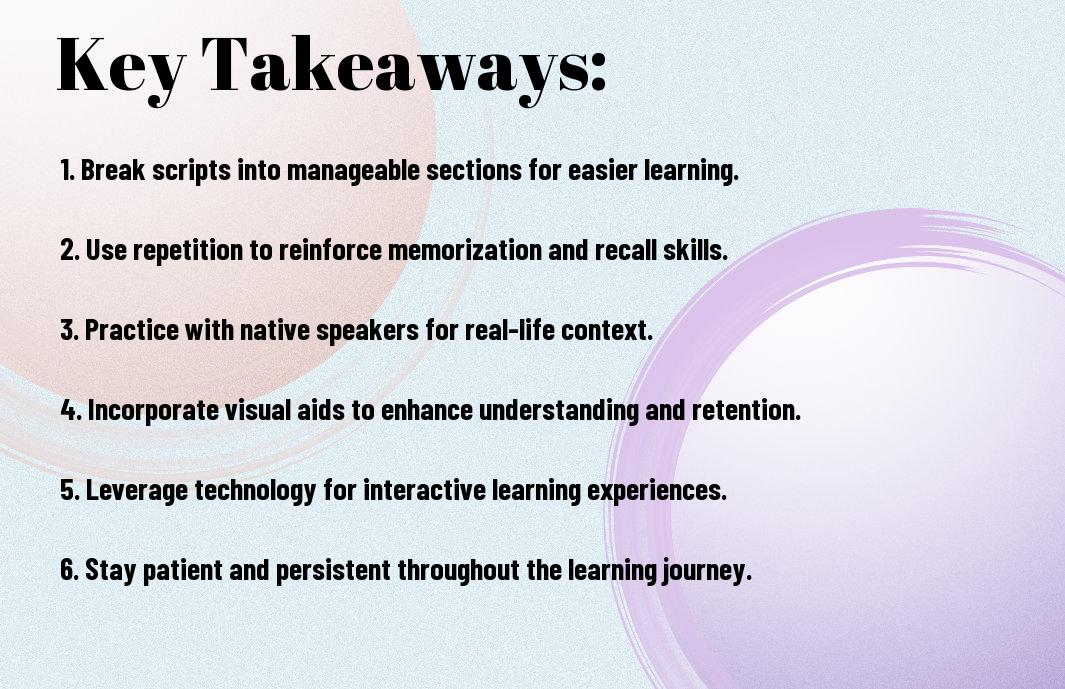As you initiate on learning a new language, you will inevitably encounter scripts that challenge your abilities. You may struggle to decipher the intricate characters of Chinese or the complex alphabet of Arabic. Your journey to mastering these scripts will require dedication and persistence. You will need to develop strategies to overcome the obstacles that stand between you and fluency. By following the right approach, you can overcome the difficulties and unlock the secrets of even the most daunting language scripts, expanding your linguistic horizons and broadening your cultural understanding.
Key Takeaways:
To master difficult language scripts, consider the following points:
- Start by familiarizing yourself with the alphabet and syntax of the language, as this will help you to better understand the script and its components.
- Practice regularly, using a variety of texts and exercises to help you become more comfortable with the script and improve your reading and writing skills.
- Focus on character recognition, as this is a key part of mastering any language script, and use flashcards or other memorization techniques to help you learn and retain new characters.
- Use language learning apps and online resources to supplement your studies and provide additional support and guidance as you work to master the script.
- Immerse yourself in the language by watching TV shows and listening to music in the target language, as this will help you to get used to the sound and rhythm of the language and improve your overall comprehension.
Acquiring Basic Knowledge
While delving into a difficult language script, you need to start by acquiring basic knowledge of its core components, which will serve as the foundation of your learning journey, enabling you to navigate the complexities of the script with greater ease.
Familiarizing with the Script
Learning the Alphabet
Any attempt to master a difficult language script begins with learning its alphabet, where you focus on recognizing and writing the individual letters, a process that requires patience and dedication, as you commit each symbol to memory.
Basic knowledge of the alphabet is important, as you will use it to build upon more complex aspects of the script, such as grammar and vocabulary, and as you practice writing and reading, you will become more comfortable with the script’s intricacies, allowing you to progress in your mastery of the language.

Practicing Correct Pronunciation
Even with a solid understanding of a language’s script, pronunciation can be a significant challenge. You will need to practice regularly to develop an ear for the sounds and rhythms of the language, and to train your mouth and tongue to produce them correctly.
Audio Resources
Before submerging into pronunciation practice, you should gather a variety of audio resources to help guide you, such as language learning podcasts, audio lessons, and native speaker recordings, which will aid you in developing your listening and speaking skills.
Mouth and Tongue Positions
Behind every correct pronunciation lies a precise physical movement of your mouth and tongue, you must pay attention to how your articulatory organs move when forming words, and imitate the positions used by native speakers to achieve accurate pronunciation.
Consequently, as you focus on the positions of your mouth and tongue, you will begin to notice improvements in your pronunciation, and by consistently practicing these movements, you will develop muscle memory, enabling you to speak more confidently and fluently in your target language.
Reading and Writing Techniques
Your journey to mastering difficult language scripts begins with developing effective reading and writing techniques. You can find valuable insights from experienced language learners on For those of you who learned many script or writing systems, which were the most difficult to learn.
Basic Sentences and Phrases
Besides developing an understanding of the script, you need to start with basic sentences and phrases to build your foundation. You will find that constructing simple sentences helps you get familiar with the script’s syntax and structure.
Common Grammar Rules
After grasping the basics, you will need to investigate common grammar rules that govern the language. You should focus on understanding the rules that apply to the script you are learning.
To further develop your skills, you will need to practice applying these grammar rules in context, using exercises and language learning tools to reinforce your understanding. As you progress, you will become more comfortable with the script and develop the ability to express yourself effectively in the target language.

Building Vocabulary
After laying the foundation of a difficult language script, you will need to focus on expanding your vocabulary to improve your overall proficiency. This involves learning new words, phrases, and expressions that are commonly used in the language.
Flashcards and Memorization
The most effective way to build your vocabulary is through repetition and practice, using tools like flashcards to help you memorize new words and their meanings, allowing you to recall them easily when needed.
Contextual Learning
Against the traditional methods of memorization, you can also learn vocabulary in context, by reading books, articles, and other materials written in the target language, which helps you understand how words are used in different situations.
Even as you progress in your language learning journey, you will find that contextual learning becomes increasingly important, as it allows you to see how words and phrases are used in everyday language, making it easier for you to absorb and retain new vocabulary, and to use it in your own writing and conversation.
Immersion and Practice
Once again, consistent practice is key to mastering difficult language scripts. You can find valuable resources on Best ways to learn a new script? : r/languagelearning, where users share their experiences and tips.
Language Exchange Programs
On the path to fluency, you’ll encounter various language exchange programs that can help you practice your script with native speakers.
Media and Entertainment
Exchange your usual TV shows and movies with ones in the target language to get accustomed to its script and pronunciation.
And as you research deeper into the world of media and entertainment in your target language, you’ll find that your comprehension and reading skills improve significantly, allowing you to tackle more complex texts and scripts with ease, and your ability to write in the target language will become more natural, enabling you to express yourself more effectively.
Overcoming Challenges
Keep in mind that mastering difficult language scripts takes time and practice. You will encounter obstacles, but persistence is key to overcoming them.
Dealing with Frustration
One of the biggest hurdles you will face is frustration, which can be overwhelming at times. You must learn to manage your emotions and stay focused on your objectives.
Setting Realistic Goals
For instance, setting achievable milestones will help you track your progress and stay motivated. You should break down your goals into smaller, manageable tasks to avoid feeling overwhelmed.
Goals that are realistic and attainable will help you build confidence in your ability to master difficult language scripts. You will be able to see your progress, which will encourage you to continue practicing and improving your skills, ultimately leading to mastery of the script. You can then apply your knowledge to read and write in the language with ease.;
Conclusion
To wrap up, you have now gained insight into the techniques for mastering difficult language scripts. Your dedication and persistence will be the keys to unlocking the intricacies of these scripts. As you continue to practice, you will find that your proficiency grows, and your ability to comprehend and write in these scripts becomes more fluid, allowing you to navigate complex texts with greater ease and confidence in your newfound skills.
FAQ
Q: What are the most effective ways to learn a difficult language script, such as Chinese characters or Arabic?
A: Mastering a difficult language script requires a combination of consistent practice, exposure to the language, and the use of various learning tools. Start by familiarizing yourself with the basic strokes and shapes of the characters, then gradually move on to more complex ones. Utilize language learning apps, textbooks, and online resources that provide step-by-step instructions and practice exercises. Additionally, immerse yourself in the language by watching TV shows or movies with subtitles, listening to music, and engaging in conversations with native speakers.
Q: How can I improve my handwriting skills in a language with a complex script, such as Japanese or Korean?
A: To improve your handwriting skills in a language with a complex script, it’s imperative to practice regularly and focus on the correct stroke order and character formation. Begin by practicing the basic strokes and gradually move on to more complex characters. Use language learning workbooks or practice sheets to help you develop muscle memory and improve your handwriting. You can also use digital tools, such as language learning apps or online handwriting practice platforms, to receive instant feedback and track your progress. Furthermore, study the handwriting of native speakers and try to mimic their style to develop a more authentic and natural handwriting.
Q: What are some common mistakes to avoid when learning a difficult language script, and how can I overcome them?
A: Common mistakes when learning a difficult language script include inconsistent practice, poor character formation, and insufficient exposure to the language. To overcome these mistakes, establish a regular practice routine and set achievable goals for yourself. Focus on building a strong foundation in the basics of the language, including grammar, vocabulary, and pronunciation. Additionally, seek feedback from language exchange partners, tutors, or online communities to identify areas for improvement and Stay motivated by tracking your progress, celebrating small victories, and embracing the challenges of learning a new script.


